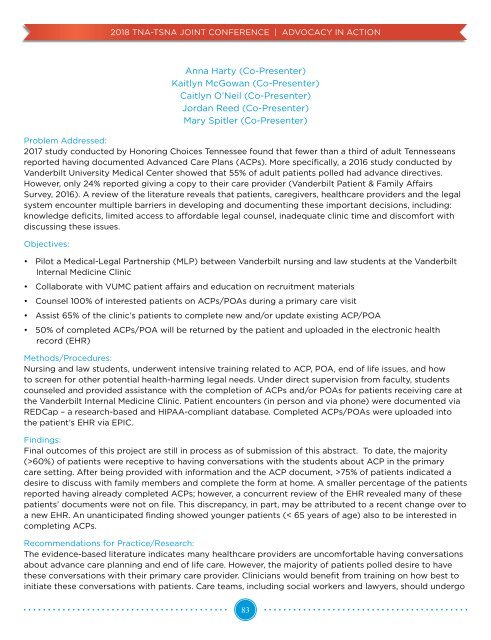2018 TNA and TSNA Joint Annual Conference
Create successful ePaper yourself
Turn your PDF publications into a flip-book with our unique Google optimized e-Paper software.
<strong>2018</strong> <strong>TNA</strong>-<strong>TSNA</strong> JOINT CONFERENCE | ADVOCACY IN ACTION<br />
Anna Harty (Co-Presenter)<br />
Kaitlyn McGowan (Co-Presenter)<br />
Caitlyn O’Neil (Co-Presenter)<br />
Jordan Reed (Co-Presenter)<br />
Mary Spitler (Co-Presenter)<br />
Problem Addressed:<br />
2017 study conducted by Honoring Choices Tennessee found that fewer than a third of adult Tennesseans<br />
reported having documented Advanced Care Plans (ACPs). More specifically, a 2016 study conducted by<br />
V<strong>and</strong>erbilt University Medical Center showed that 55% of adult patients polled had advance directives.<br />
However, only 24% reported giving a copy to their care provider (V<strong>and</strong>erbilt Patient & Family Affairs<br />
Survey, 2016). A review of the literature reveals that patients, caregivers, healthcare providers <strong>and</strong> the legal<br />
system encounter multiple barriers in developing <strong>and</strong> documenting these important decisions, including:<br />
knowledge deficits, limited access to affordable legal counsel, inadequate clinic time <strong>and</strong> discomfort with<br />
discussing these issues.<br />
Objectives:<br />
• Pilot a Medical-Legal Partnership (MLP) between V<strong>and</strong>erbilt nursing <strong>and</strong> law students at the V<strong>and</strong>erbilt<br />
Internal Medicine Clinic<br />
• Collaborate with VUMC patient affairs <strong>and</strong> education on recruitment materials<br />
• Counsel 100% of interested patients on ACPs/POAs during a primary care visit<br />
• Assist 65% of the clinic’s patients to complete new <strong>and</strong>/or update existing ACP/POA<br />
• 50% of completed ACPs/POA will be returned by the patient <strong>and</strong> uploaded in the electronic health<br />
record (EHR)<br />
Methods/Procedures:<br />
Nursing <strong>and</strong> law students, underwent intensive training related to ACP, POA, end of life issues, <strong>and</strong> how<br />
to screen for other potential health-harming legal needs. Under direct supervision from faculty, students<br />
counseled <strong>and</strong> provided assistance with the completion of ACPs <strong>and</strong>/or POAs for patients receiving care at<br />
the V<strong>and</strong>erbilt Internal Medicine Clinic. Patient encounters (in person <strong>and</strong> via phone) were documented via<br />
REDCap – a research-based <strong>and</strong> HIPAA-compliant database. Completed ACPs/POAs were uploaded into<br />
the patient’s EHR via EPIC.<br />
Findings:<br />
Final outcomes of this project are still in process as of submission of this abstract. To date, the majority<br />
(>60%) of patients were receptive to having conversations with the students about ACP in the primary<br />
care setting. After being provided with information <strong>and</strong> the ACP document, >75% of patients indicated a<br />
desire to discuss with family members <strong>and</strong> complete the form at home. A smaller percentage of the patients<br />
reported having already completed ACPs; however, a concurrent review of the EHR revealed many of these<br />
patients’ documents were not on file. This discrepancy, in part, may be attributed to a recent change over to<br />
a new EHR. An unanticipated finding showed younger patients (< 65 years of age) also to be interested in<br />
completing ACPs.<br />
Recommendations for Practice/Research:<br />
The evidence-based literature indicates many healthcare providers are uncomfortable having conversations<br />
about advance care planning <strong>and</strong> end of life care. However, the majority of patients polled desire to have<br />
these conversations with their primary care provider. Clinicians would benefit from training on how best to<br />
initiate these conversations with patients. Care teams, including social workers <strong>and</strong> lawyers, should undergo<br />
83

















